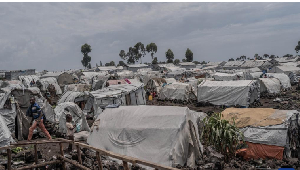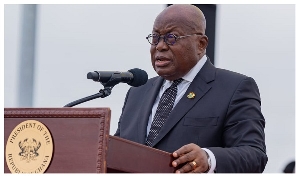- Home - News
- TWI News | TV
- Polls
- Year In Review
- News Archive
- Crime & Punishment
- Politics
- Regional
- Editorial
- Health
- Ghanaians Abroad
- Tabloid
- Africa
- Religion
- Election 2020
- Coronavirus
- News Videos | TV
- Photo Archives
- News Headlines
- Press Release
Entertainment of Monday, 12 January 2004
Source: e. ablorh-odjidja
TV Africa's demise ends free-to-air television in Africa?
TV Africa’s liquidation occurred on October 1, 2003, thus exposing the fragile nature of the media in Africa, especially free-to-air-television. The action quickly brought up doubts about future investments in the television industry in Africa.
Was the failure due to a poor concept, wrong strategy or implementation or was the investment a benevolent act without a steely purpose?
TV Africa was to do for Africa what free-to-air commercial television has done for the rest of the free world. It had presence in over 29 sub-Saharan countries. As a pan-African network, its mission was to offer programs to otherwise small television stations in return for spots for commercials on the local stations’ channel.
The company was a wholly-owned subsidiary of Africa Media Group (AMG), with IFC and others as shareholders. In a statement released by the IFC, the group said they “were saddened by the necessity to file an application for the liquidation of the Company.”
The statement also said that “Since the Company's inception in 1998, AMG's shareholders have demonstrated a deep commitment to the Company and the African media industry, through an aggregate investment of approximately US$57 million. However, AMG's continued inability to meet its sales forecasts convinced the shareholders that the business, as structured, was not viable in the long-term.
“The business as structured”? Would a change invite more investments? A conversation with an investment officer at IFC confirmed that other options were considered to keep TV Africa afloat. None proved suitable.
Understandably, profit is why people invest in business. But this is television. It should be worth more to society than a cash cow.
Television, as a branch of the media, contributes significantly to society. And it is in developing countries that the contributions are mostly needed; as evinced by concerns from the West over media activities in the former communist countries of Eastern Europe.
Samatha Powers, a noted human rights activist and a lawyer from Harvard, remarked recently in Atlantic Monthly that “One of the most provocative and intriguing claims in human rights... is the claim of Nobel Prize-winner Amartya Sen that no country with a free press has ever had a famine.”
In a nutshell, nations that have vibrant media are blessed. No one expects the IFC and her group of investors to risk money on TV Africa to transform Africa into a bread basket. But a five years investment period for one network is too short a time and too narrow based to support the transformation process that is needed for the industry.
Network television was a huge experiment for years in America before it became what it is now; driven by the power of free-to-air commercials.
David Brinkley, the famous America television news anchorperson, described the television nascent days this way: “What put (television) in business… was the experience of a small manufacturer of lipstick called Hazel Bishop. In the year before television commercials …her profit was $49,257. Three years after her first commercial television appeared on television, her lipsticks made a one year profit of $10,100,682.”
The phenomenon has been repeated the world over; except it is yet to be realized in Africa. Understandably, Africa is not a hot bed of industry. But Africa has a viable market because it consumes what others have manufactured.
The pan-African network model used by TV Africa provided a more potent face of the African market. Fragmented, the individual markets are weak, with the exception of Nigeria, South Africa and a few others. The operative concept, therefore, made sense because it knitted all the weak markets into one strong entity.
Describing TV Africa, Charlotte Matthews of South Africa's Business Day said to the BBC last year that it “was quite an important station" and that the “collapse of TV Africa is a bit unfortunate …. because it could leave a bit of a sour taste in (potential investors’) mouths."
Frankly, it is the effect of the “sour taste” that is worrisome to many Africans in the industry. It puts the industry under shroud, because IFC and her group’s action can discourage further investments.
And who would fault the protest? The ingredients are there for a viable free-to-air television. TV Africa was reported to have a large foot print on this continent, where even shoddy commercials could be instant hits. And based on the viewing habits of audiences in Africa, TV Africa’s viewers might have ranged above 100 million.
Clearly, TV Africa's demise is a wake up call. There is a need to look at the industry again. It is too crucial a resource to be allowed to wobble into the future.
Free-to-air commercial television in Africa means that someone has goods to sell. It also means that, Africans, mostly consumers, are the target, and certainly are worth the $57 million investment in TV Africa. So where did the company go wrong?
According to TV Africa, instead of some affiliates in various countries showing adverts in preferred, scheduled time slots for the network, they substituted these for others they had sold locally, thereby “making it impossible for TV Africa to bill its clients.”
This would lead one to assume that the rules to make the concept work were either absent or lax.
The market was there. The money was also there to be tapped. But the proceeds were going into wrong pockets; hence the need for rules and process refinement, which, clearly, require a government input.
In some instances government, instead of helping, found itself in direct competition with TV Africa.
In Nigeria, the next largest television market to South Africa’s, the government station (NBC) was TV Africa’s main competitor. Affiliates of NBC were discouraged from using signals from TV Africa, except for sports programs. Since NBC had its choice of stations long before TV Africa was founded, the latter found itself at disadvantage with affiliate stations in secondary markets.
Bayo Adibiyi, TV Africa’s regional sales manager lamented to a Nigerian paper that, “If the NBC had allowed TV Africa to string together this network of about 40 Nigerian stations, we would have …the biggest television network in the country with huge potential for attracting advertising revenue because of the reach such a network would have provided advertisers."
Something is amiss here. Why the competition? Why couldn’t stations in Nigeria and elsewhere share and mix programs, considering the dearth of quality programs on the continent?
The programs offered on many television stations in Africa are mostly old American movies, and ridiculous collections of “soaps” from all regions of the world. Creative local programming, in the case of TV Africa, could have captured the imagination of African audiences to the extent that any attempt to shut the network down would have raised a howl of protest from the continent.
Instead, there was relative silence. Meanwhile, in Europe, BBC3’s controller, Stuart Murphy was telling the Guardian (UK) on December 10, 2003 that his station was looking to Africa for material to spice her own staid programming.
TV Africa’s demise must not be the end. The “sour taste” should not happen, because if the same standard for investment is applied to some critical industries in Africa, few would stand. Television has its own energy, and it should not be capped.
E. Ablorh-Odjidja Publisher, ProfileAfrica.com Washington, DC, January 10, 2004










